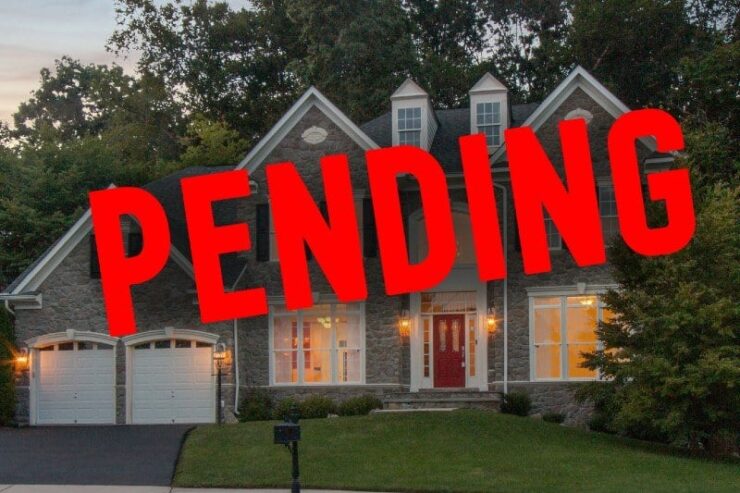After months of house hunting, you believe you’ve discovered the ideal home. However, upon checking online, the property’s status reads “sale pending.” Does this mean you’ve missed your chance?
The status isn’t “sold,” so what does “pending” imply for a property on sale, and what can you do if you’re keen on it?
What Does “Sale Pending” Signify in Property Transactions?
In the realm of property transactions, a pending sale indicates that an offer on the house has been made and accepted by the seller.
However, the transaction hasn’t been completed, which is why it’s labeled as “pending” rather than “sold.” If a property piques your interest and it’s listed as pending, it’s advisable for your realtor to liaise with the seller’s agent to get insights on its status. There might be a slim possibility for you.
Is It Possible to Bid on A Home Labeled as Pending?
The straightforward answer is yes. However, it might not be the best move. While a pending agreement isn’t irrevocable, it’s not entirely up for renegotiation either.
Unless the ongoing deal collapses, outbidding or forgoing certain stipulations won’t necessarily sway the seller. Typically, sellers are bound by a contract to respect the existing agreement, even if a more lucrative offer emerges.
Why Might a Pending Sale Return to The Market?
While it’s plausible for a pending sale to revert to the market, it’s not always a guarantee. Various factors can cause a real estate transaction to collapse. Here are some prevalent reasons:
Loan Complications
Sometimes, a buyer’s loan might not materialize as anticipated before the finalization of the deal. While many prospective buyers receive mortgage pre-approval before placing an offer, the mortgage isn’t confirmed until it undergoes underwriting.
During this phase, the buyer’s financial details, such as assets, income, and other relevant data, are scrutinized. If discrepancies emerge during this verification, the mortgage might be declined. Additionally, if there’s a notable shift in the buyer’s financial status, like changes in credit score, assets, or income, it could impede the loan’s approval.
Contracts often encompass a mortgage clause, which denotes the deadline for the buyer to finalize their financing. If the buyer fails to meet this deadline, it’s considered a contract violation. In such scenarios, the seller might opt to relist the property.
Unsatisfactory Property Evaluation
A deal might fall apart if the home inspection reveals significant concerns. This is especially likely if the offer was contingent on a satisfactory inspection. For the property to be relisted due to this, a certified inspector would need to highlight substantial repair or upgrade needs. The deal could break if the buyer declines the seller’s proposal to address these issues (if presented).
Short Sale Explained
In situations where homeowners face financial hardships, a short sale provides an option to sell their property for a value less than the outstanding loan amount, helping them avoid foreclosure. However, there’s a catch: The lender must give their consent for a short sale to proceed. If the financial institution doesn’t approve the proposed sale price, the transaction won’t materialize, and the property will be relisted.
Change of Heart by The Buyer
Unpredictable life events can disrupt planned transactions. A buyer might need to move due to job requirements or might reassess and conclude that the property isn’t the right match. Even though opting out might cost them their earnest money deposit, buyers can still choose to withdraw from the deal. On the off chance that such a scenario unfolds, the property’s status will shift from “pending” back to “available” on the market.
How Do “Pending” and “Contingent” Differ in Real Estate?
While both “pending” and “contingent” statuses signify that the seller has accepted an offer, they have distinct implications.
A contingent sale means the listing remains active because the potential buyer has conditions or contingencies to fulfill before the sale can be finalized. On the other hand, a pending sale suggests that all contingencies set by the buyer have been met, and the sale is on track to be completed soon, barring any unforeseen complications.
FAQ
Does pending mean complete?
No, “pending” does not mean the sale is complete. It indicates that an offer has been accepted, and the sale is in the final stages, but it hasn’t closed yet.
What is the difference between pending and accepting backup offers?
While both statuses indicate that an offer has been accepted, “pending” means the sale is nearing completion with all contingencies met. On the other hand, “accepting backup offers” suggests that the seller is open to considering other offers in case the current deal falls through.
How long can pending last?
The duration of a pending status can vary, typically lasting from a few days to several weeks. It depends on various factors, including the contingencies set forth in the purchase agreement and the efficiency of the involved parties.
How long should I wait for pending?
If you’re a buyer interested in a property with a pending status, it’s advisable to consult with your real estate agent. They can provide insights on the specific situation and guide you on whether to wait or explore other options.
What does pending back up mean?
“Pending back up” means that while the property is under contract with an accepted offer, the seller is still open to backup offers in case the current deal doesn’t close.
In a Nutshell
Just because a property is listed as pending doesn’t mean it’s entirely out of reach. While the odds might not be in your favor, unforeseen circumstances can cause the sale to fall apart, making the property available again. If you’re truly passionate about a home with a pending status, it’s wise to engage with your real estate agent. They can guide you in placing a backup offer or seizing the opportunity if the current deal doesn’t materialize.
















